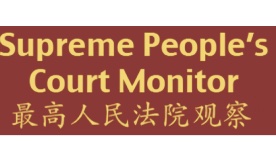For those monitoring legislative developments, there’s much to see in this document—the revision of the Arbitration Law (about which I wrote in December https://
Susan Finder writes..
Among the many issues that I am discussing in my “neverending article” is the role of the Supreme People’s Court (SPC) in the complicated process of drafting new legislation and amending existing legislation, as is sometimes revealed in the “Services and Safeguards Opinions” about which I write often. The role of the SPC is for the most part unseen and unnoticed. Because the Arbitration Law is so critically important to dispute resolution between Chinese and non-Chinese parties, this blogpost highlights the SPC’s role in the unfinished process of revising the Arbitration Law and includes some of my own comments on the positions taken by the SPC. I flag one particular issue that in my view would benefit from discussion and analysis by those with international arbitration law expertise.
Justice Tao Kaiyuan participated in a meeting of the Chinese People’s Political Consultative Conference (CPPCC)’s Committee on Social and Legal Affairs on 30 May on the Arbitration Law draft revision (link is to the Chinese original) and provided a summary of some of the work of the SPC and lower courts in “pushing forward the progress of amending the Arbitration Law. ” (Mao Xiaofei of the Chinese Academy of Social Sciences, International Law Institute has kindly shared her translation into English of the Arbitration Law revision, which includes a comparison with the current text.)
The 2020 document Guiding Opinions of the Supreme People’s Court on the People’s Courts Serving and Guaranteeing the Further Opening Up to the Outside World (??????????????????????????????) about which I previously wrote, contains the phrase “push forward the progress of amending the Arbitration Law (and several other laws) (?????????????????????????????????). Additionally, the Annual Report on Judicial Review of Commercial Arbitration (2019), edited by the SPC’s #4 Civil Division (I had a cameo role in improving the English version) also mentions the SPC will support the amendment of the Arbitration Law. Persons whose eyes glaze over when reading official documents would miss this curious phrase. Few persons outside of China have access to the Annual Report.
Xu Liquan, one of the deputy heads of the CPPCC, also spoke at the 30 May meeting discussing the Arbitration Law draft and revealed arbitration statistics I had not previously seen–that Chinese foreign-related enterprises have a dispute rate of up to 10% ( ???????????10%) in cross-border transactions, over 90% select arbitration as the dispute resolution method, but a large majority select arbitration outside of China. Mr. Xu did not mention the source of these statistics, but I understand them to be derived from a report by the China Arbitration Institute of the China University of Political Science and Law (CUPL). The report summarizes the China Arbitration Institute’s survey of more than 100 foreign-related enterprises recommended by the State-Owned Assets Supervision and Administration Commission (SASAC). The full report has not yet been made public.
From these statistics, it can be seen that if China wants to be considered a more attractive destination for commercial dispute resolution, improving the Arbitration Law is crucial.
Read full article
Supreme People’s Court’s Ongoing Contribution to the Revision of the Arbitration Law




